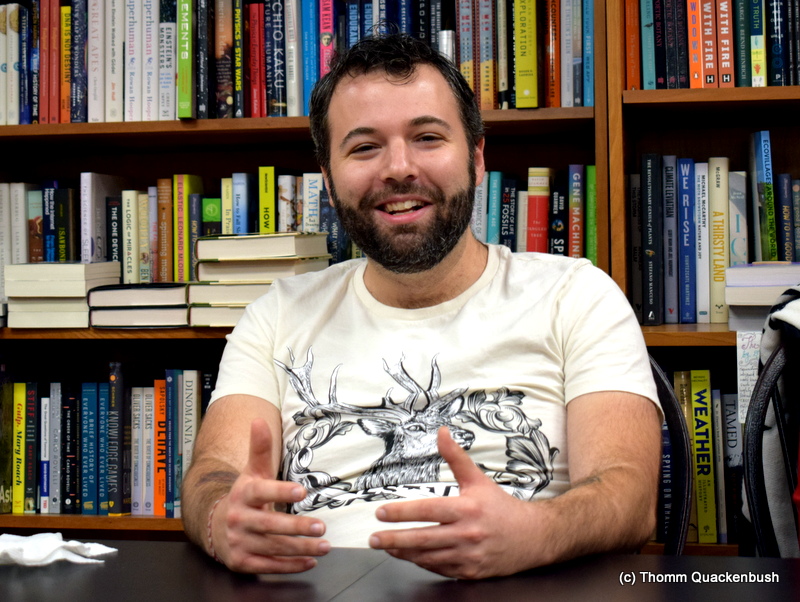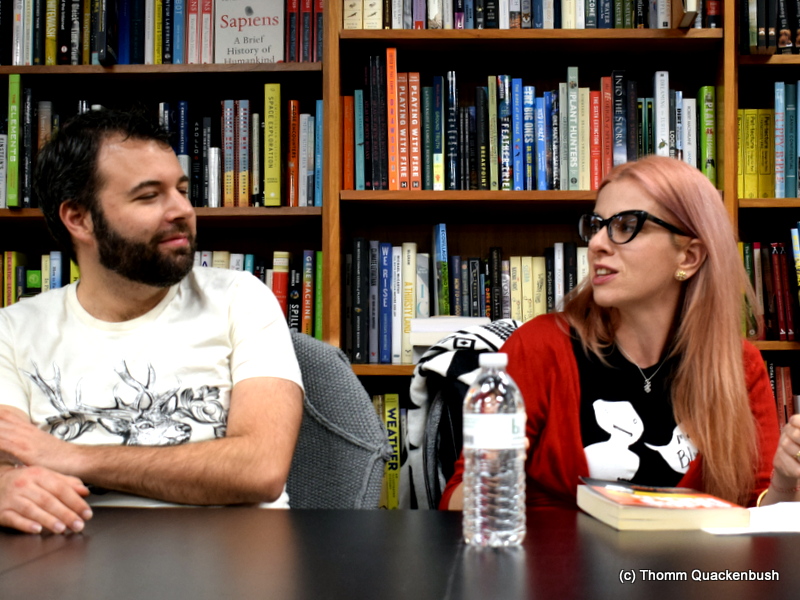
11.29.18
-William Allingham
Writing is learning to say nothing, more cleverly each day.
Alice Isn't Joseph Fink

I loved the first season of Alice Isn't Dead, and the reason for this talk tonight. I liked most of the rest of his work, though I am selective in what I listen to, having a backlog of over 400 podcasts downloaded in earnest hope. Sacrifices must be made.
Watching Joseph Fink read from his newest book is a small thing, but I still was so fumblingly nervous I spill my early dinner on the floor.
Amber is not around tonight, nor did I expect her to be, which leaves me to fret without dilution. I observe myself behaving strangely, almost able to predict mishaps, wondering if this prognostication does not itself cause misfortunes to occur.
I figured out somehow, an article or literary gossip, that Fink had moved to Red Hook, my residence of the last seven years, which seemed curious luck. Writers whom I envy or admire have found a home or job near me, first Neil Gaiman and now Fink. I wonder what it is about this area, if it is mere luck or should I attribute this into something more cosmic. I am so given to magical thinking and know this about myself, so I both believe they are here to play a role in my life and that this notion borders on schizophrenia.
Fink says that the Alice Isn't Dead book is less a novel than a road trip. The podcast gives that feeling and, when I read the book, it seems more so. There is something disjointed to it, big leaps that are glossed over. It is a fine read and Fink has some beautiful passages. Some of what is added informs and stretches the story, though I miss some of what was removed for being digressive, leaving holes. The podcast had its genesis from the places Fink and crew passed through or visited on their tours for Welcome to Night Vale, along with his own personal journeys. American Gods was born similarly, and I would not be the artist I am without that book, so I am not going to disparage a written road trip. Bill Bryson's travel books are also perennially on my nightstand, and I've begun my own book of travel essays, though it is going to cleave as close to the truth as possible for modesty.
Fink and his wife, Meg Bashwiner, enter Oblong Book, a bookstore in Rhinebeck. As always, I am given to research anyone I am likely to see, whom I want to see, so I recognize him. The other people, gathered on folding chairs, continue talking because they only know him by voice and words. This is the blessed nature of writers, where people can love us and, in person, have no idea who we are.
Fink has a scruff of beard and sideways smile, unassuming in a t-shirt with a deer on it. He could slip by without notice among a sea of other rounded, bearded men, who are legion.
Bashwiner, a bigger character than I realizes (though I would know the writer of something more readily than the voice actress), is librarianish, which dark rimmed, cat-eye glasses and pale pink hair.
He is soft spoken and familiar from starting Night Vale with A "Hey, I love you" that nearly sounds genuine. Though why shouldn't he love the people who have allowed him the ability to travel the world working with people he likes and respects? I am thrilled by my fans, though I do not find them in profusion. I might be initially intimidated by being read -- what else is the purpose of all this work if that is not my goal? -- but he has had years to grow accustomed to being liked and followed.
Bashwiner is more matter of fact, having glared down more than her share of these talks. One gets the feeling that she wants to be out of this small bookstore already, not that it offends her, but because it could be any bookstore in the last three years. They both give a phatic, automatic acknowledgement that they like this store because it is close to their adopted home, but I would say the same no matter where I was.
Meg is borderline standoffish, but that is because she has done this so often with Fink, her husband and collaborator. She knows the rhythm of these talks and she doesn't wish to dawdle over any of the slogs. When it is time to ask questions, she reminds in rapid-fire that we are to wait until we are in the signing line to say something personal, that we should get a blog if we want to make a comment, and that they will only answer questions for a few minutes. The time is theirs and I am sure that this if out of an abundance of caution. No one seems to mind, as her delivery is smiling enough that we could take it all for a joke.

A large part of the talk is about food, particularly bread, which Fink finds soothing to make by hand. Bashwiner prompts that the description of the Thistlemen eating, particularly an initial omelet, stands in stark contrast with the warm cooperation of Keisha and Alice making pizza, as that is an act of love and creation, one Fink purloined directly from his own life. Fink listens to this theory as though it were just occurring to him, which may be the case. Writers are capable of being the last people who know what their books are about.
I ask Fink if there is anything in his stories that surprised him, seeing this as a natural follow-up. He declines the idea that a main character can surprise the author and anyone who has had that experience is a lesser author with weaker prose, a comment I take personally even though I am no one to him. Then he points out that Sylvia in Alice Isn't Dead was meant to be a far smaller character, but he came to like her and wanted to see where it would go, which I would count as a surprise. I am uncertain why he wouldn't.
A teen girl prefaces her question with the note that she had brought a rosemary bread for him. She is knowledgeable about his preferences for baked goods. In his shoes, I am not sure I would accept food from fans.
Fink preaches that the core of writing minority characters is to realize they are people and that white people should absolutely do it. He specifically fingers the Cohen brothers as having a movie where a woman does not speak until after the first hour, which is when he shut it off.
A girl asks what one should do when one hates one's work and oneself. Fink says, in essence, suck it up and keep writing.
I am first to have my book signed, as I was the first to arrive at the bookstore and was in the front of the few rows. He dissembles that he usually has people give him post-its with their names. I hand him one of my business cards, already in hand. "This is not my first book signing."
He writes a quick "Hi, Thomm" at the top and signs it with a tall cursive Z, the import of which I cannot guess. Can get away with writing single letters that are not in my name? It would save some time. He slides my card into the book for me to take with me, which was subtly not my intention in handing it to him.
He tells me to wait a minute while he signs another book. I wonder if this is a good thing, if he's decided there is something more for us to discuss. Then he turns away and does not look back at me again. I did not expect much from the interaction, but I feel like Ralphie from A Christmas Story struck dumb on Santa's lap, shoved down the slide before he could articulate that he wants that Red Rider BB gun. I have more dignity than to brace my legs against the metaphorical sides and crawl my way back. Joseph Fink is a writer who happens to now live in my area. He is not the giver of gifts.
Given the nature of my anxiety, I had planned out the best and worst possible outcomes, plotting how to come closest to the former and avoiding the latter. The best was that Fink knows who I am and this results in vague friendship and offers of writing collaboration. The worst, I suppose, was that I am so obnoxious in his eyes that he orders me banned from the store. Neither are likely.
I once asked to do an event at Oblong and was rebuffed because they didn't stock books that were on Amazon, though that must have been a miscommunication, as every book is on Amazon. I am not shy about offering up my services anywhere that might result in good publicity. I was recently on Taff, a German television program, on Proseiben. They translated a fifteen second clip of my interview, though I expect the point of the segment was to mock the Pine Bush UFO Fair and those on whom the camera was turned. I am very okay with mockery that could result in attention and sales (I have no sign this interview did either).
As I am readying to leave, seeing no more reason to stick around, a cheerful member of the local writing community greets me, though I take a few second to place her. We talk briefly, she is excited to see me, and I invite her to my coming Christmas talk. This is enough of a message for my pattern seeking brain.
Soon in Xenology: 38.
last watched: Angel: The Series
reading: The Art of Asking
listening: Bastille